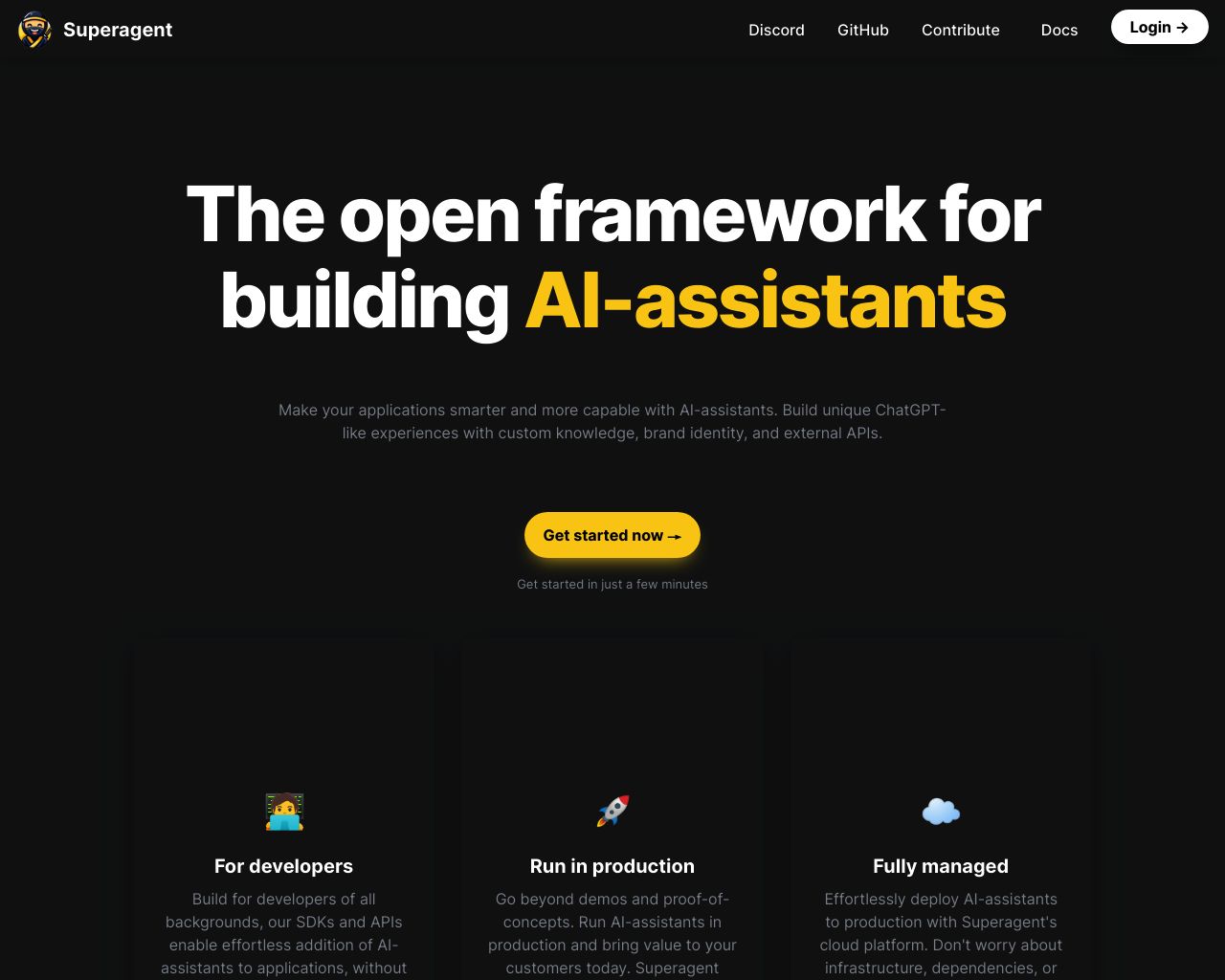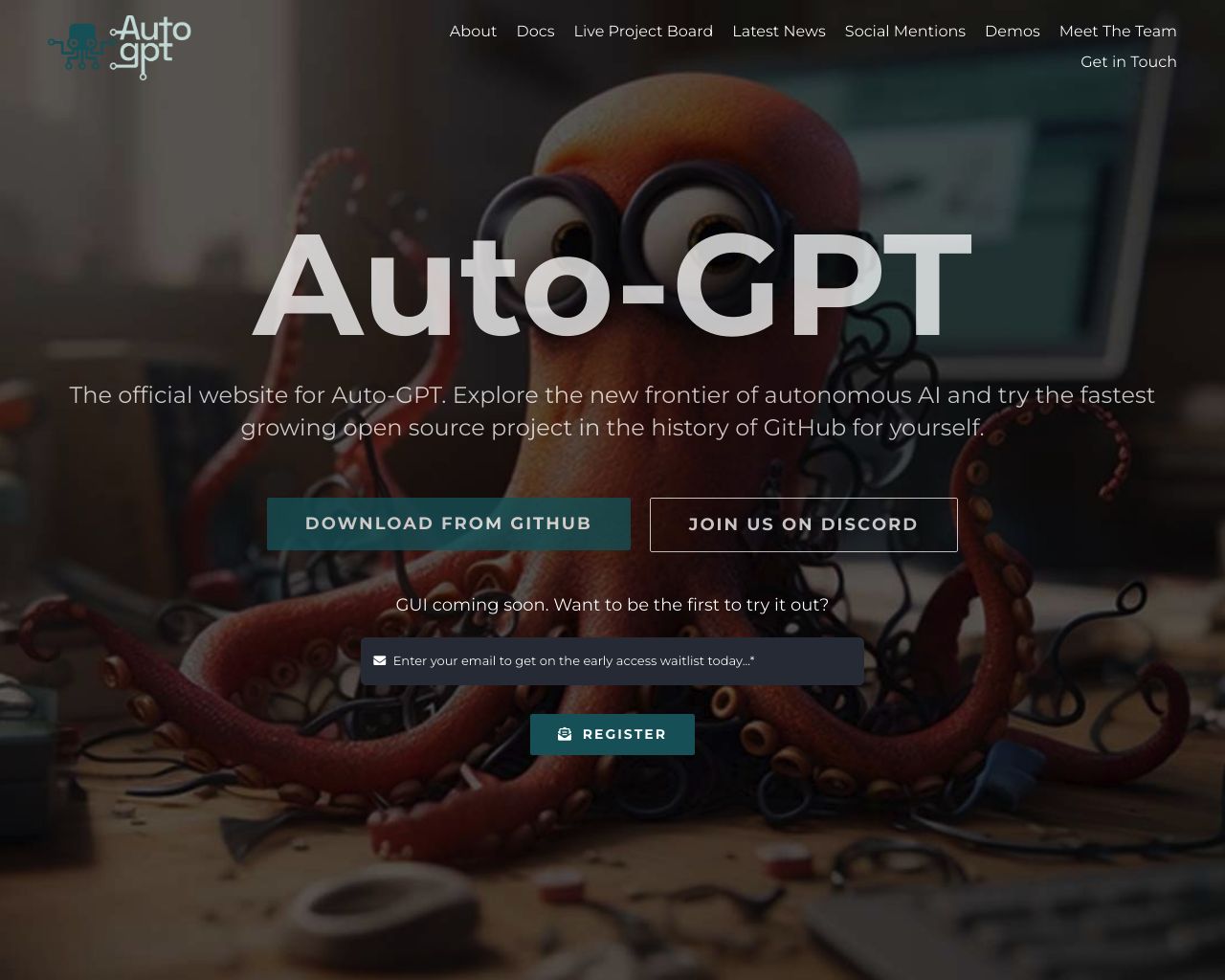Superagent Vs. AutoGPT: An In-Depth AI Platforms Comparison
AI agents revolutionize business processes, automating complex tasks and enhancing decision-making. Superagent and AutoGPT stand out in this rapidly evolving field, each offering unique approaches to AI development. Superagent simplifies agent creation with its user-friendly platform, while AutoGPT pushes boundaries with autonomous, self-prompting agents. This comparison explores their features, strengths, and limitations, helping developers, business leaders, and AI enthusiasts choose the right tool. We’ll also introduce SmythOS, a powerful alternative that combines intuitive design with advanced capabilities, addressing the shortcomings of both platforms.
Superagent Overview
Superagent empowers developers to create, host, and manage AI agents without complex coding. This open-source platform streamlines the development of intelligent assistants for web research, sales, marketing, and project management.
Superagent stands out with its user-friendly approach, allowing customization through simple markup. This accessibility opens AI development to a broader audience, including non-experts. The platform offers robust integration options, including an API and SDKs for seamless incorporation into various applications.
Superagent empowers developers to create, host, and manage AI agents without complex coding. This open-source platform streamlines the development of intelligent assistants…


Superagent’s AI agents excel in automating complex tasks traditionally requiring significant manual effort. They can autonomously browse the web, access files, and integrate with tools like Airtable, Salesforce, and various APIs. This capability enables businesses to streamline operations, from gathering detailed customer information for sales to conducting competitive analysis by tracking market trends.
Superagent’s AI agents excel in automating complex tasks traditionally requiring significant manual effort. They can autonomously browse the web, access files, and integrate with tools…
While Superagent offers powerful features, it lacks some advanced capabilities. The platform doesn’t provide a visual builder or explicit support for multi-agent collaboration. Additionally, there’s no mention of explainability features or audit logs for analytics, which may limit its use in highly regulated industries.
Superagent’s integration prowess shines through its compatibility with various data sources and AI models. It supports sitemap crawling, YouTube transcript extraction, and processing of PDF, Word, and TXT files. The platform also allows the addition of Hugging Face models and integration with Zapier, expanding its utility across diverse use cases.
AutoGPT Overview
AutoGPT revolutionizes AI development with its open-source platform for creating autonomous AI agents. Leveraging OpenAI’s GPT-4, AutoGPT enables agents to self-prompt, break down complex tasks, and utilize online resources to achieve predefined goals without constant human input.


AutoGPT’s agents excel at managing long-term tasks independently, automating workflows by dividing large projects into manageable sub-tasks. The platform maintains short-term memory for context and retrieves up-to-date information from the internet, making it versatile for applications ranging from software development to market research and content creation.
AutoGPT’s agents excel at managing long-term tasks independently, automating workflows by dividing large projects into manageable sub-tasks.
Key features include the ability to debug and improve its own code, manage files for better data structure, and handle both text and image inputs. AutoGPT has spawned various specialized AI agents, such as ChefGPT for recipe generation, showcasing its adaptability across different domains.
While AutoGPT pushes the boundaries of autonomous AI, it faces challenges. The platform can be prone to errors from self-feedback loops, hallucinations, and high operational costs due to its recursive nature. It may also encounter issues with infinite loops and lacks long-term memory, which can impact performance in extended tasks.
AutoGPT’s vision aligns with the pursuit of artificial general intelligence (AGI), aiming to create AI capable of human-level intellectual tasks. Its unique selling point lies in autonomous decision-making and task execution, distinguishing it from models like ChatGPT that require continuous human prompts.
AutoGPT’s vision aligns with the pursuit of artificial general intelligence (AGI), aiming to create AI capable of human-level intellectual tasks.
As an open-source project, AutoGPT represents a significant milestone in AI development, attracting attention from the tech community and investors alike. It offers a glimpse into the future of autonomous AI agents, highlighting both the potential and challenges on the path to achieving true AGI.
Feature Comparison
Superagent and AutoGPT offer distinct approaches to AI agent development, each with its own strengths and limitations. Superagent provides a user-friendly platform for creating and managing AI agents without complex coding, while AutoGPT focuses on autonomous AI agents capable of self-prompting and breaking down complex tasks.
In terms of core components, Superagent excels in its intuitive interface and pre-built integrations, making it accessible to users with varying levels of technical expertise. It offers hosted agents for both development and production environments, along with a no-code editor for easy customization. However, Superagent lacks a visual builder and explicit support for multi-agent collaboration, which may limit its flexibility for more complex projects.
AutoGPT, on the other hand, shines in its autonomous capabilities and problem-solving skills. It can independently manage long-term tasks, debug its own code, and utilize online resources to achieve goals. However, AutoGPT faces challenges with potential errors from self-feedback loops and lacks long-term memory, which can impact its performance in extended tasks.
Regarding security features, both platforms have room for improvement. While Superagent offers some security measures like OAuth authentication and IP control, AutoGPT’s documentation does not explicitly mention robust security features. This gap in security capabilities could be a concern for enterprises dealing with sensitive data or highly regulated industries.
Feature Comparison Table
| Superagent | AutoGPT | SmythOS | |
|---|---|---|---|
| CORE FEATURES | |||
| Hosted Agents (Dev, Production) | ✅ | ❌ | ✅ |
| Visual Builder | ❌ | ✅ | ✅ |
| Explainability & Transparency | ❌ | ❌ | ✅ |
| Audit Logs for Analytics | ❌ | ❌ | ✅ |
| Agent Work Scheduler | ✅ | ❌ | ✅ |
| SECURITY | |||
| Constrained Alignment | ❌ | ❌ | ✅ |
| IP Control | ✅ | ❌ | ✅ |
| COMPONENTS | |||
| Data Lakes | ❌ | ❌ | ✅ |
| DEPLOYMENT OPTIONS (EMBODIMENTS) | |||
| Staging Domains | ❌ | ❌ | ✅ |
| Production Domains | ✅ | ❌ | ✅ |
| Deploy as Scheduled Agent | ❌ | ❌ | ✅ |
| DATA LAKE SUPPORT | |||
| Hosted Vector Database | ✅ | ❌ | ✅ |
| Sitemap Crawler | ✅ | ❌ | ✅ |
| YouTube Transcript Crawler | ✅ | ❌ | ✅ |
Best Alternative to Superagent and AutoGPT
SmythOS revolutionizes AI agent development, surpassing Superagent and AutoGPT with unmatched capabilities. Our platform empowers users to create sophisticated AI agents effortlessly through an intuitive drag-and-drop interface. Unlike competitors, SmythOS offers seamless integration across development and production environments, ensuring a smooth transition from concept to deployment. We excel in providing robust explainability and transparency features, critical for building trust in AI systems. Our platform boasts superior scalability, enabling enterprises to grow their AI solutions without limitations.
SmythOS revolutionizes AI agent development, surpassing Superagent and AutoGPT with unmatched capabilities… ensuring a smooth transition from concept to deployment.
SmythOS stands out with its comprehensive security measures, including constrained alignment and IP control, addressing the growing concerns around AI safety and data protection. We offer unparalleled flexibility in deployment options, allowing users to integrate AI agents into various systems and workflows effortlessly. From hosted vector databases to support for multiple data formats, SmythOS provides a complete ecosystem for AI development and management. Our scheduling capabilities and advanced analytics tools further enhance productivity and insight generation. With SmythOS, users gain access to cutting-edge AI technologies while benefiting from an easy-to-use, yet powerful platform that caters to both technical experts and business users alike. By choosing SmythOS, organizations can accelerate their AI initiatives, driving innovation and efficiency across all sectors.
Conclusion
Superagent and AutoGPT offer compelling AI agent development platforms, each with unique strengths. Superagent excels in user-friendliness and pre-built integrations, while AutoGPT shines in autonomous capabilities and problem-solving. However, both face limitations in security features and certain advanced functionalities.
SmythOS emerges as the superior choice, combining the best of both worlds and addressing their shortcomings. Our platform offers an intuitive drag-and-drop interface for easy agent creation, extensive integrations, and robust security measures. SmythOS supports multi-agent collaboration, provides audit logs for analytics, and ensures scalability for enterprise-level deployments.
The versatility of SmythOS sets it apart. We enable deployment across various platforms, from APIs and webhooks to site chats and scheduled agents. Our support for multiple AI models, including those from OpenAI, Anthropic, and Hugging Face, provides unparalleled flexibility. The platform’s ability to handle diverse data types, including PDFs, Word files, and TXT files, further enhances its utility across industries.
Explore our diverse range of AI-powered agent templates to jumpstart your AI journey. Create a free SmythOS account to experience the future of AI agent development with no time limit and a 30-day money-back guarantee. Unlock limitless AI integrations and revolutionize your workflow with SmythOS.
Last updated:
Disclaimer: The information presented in this article is for general informational purposes only and is provided as is. While we strive to keep the content up-to-date and accurate, we make no representations or warranties of any kind, express or implied, about the completeness, accuracy, reliability, suitability, or availability of the information contained in this article.
Any reliance you place on such information is strictly at your own risk. We reserve the right to make additions, deletions, or modifications to the contents of this article at any time without prior notice.
In no event will we be liable for any loss or damage including without limitation, indirect or consequential loss or damage, or any loss or damage whatsoever arising from loss of data, profits, or any other loss not specified herein arising out of, or in connection with, the use of this article.
Despite our best efforts, this article may contain oversights, errors, or omissions. If you notice any inaccuracies or have concerns about the content, please report them through our content feedback form. Your input helps us maintain the quality and reliability of our information.
